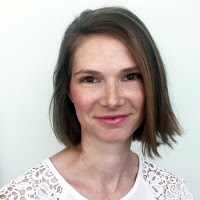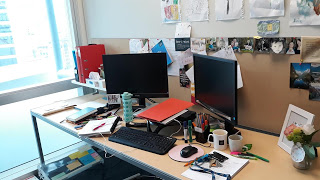I am Ayesha Scott, and This is How I Work
 Today, I have the pleasure of interviewing Dr. Ayesha Scott. Dr Scott joined the AUT Business School, Finance Department in October 2016. She obtained her PhD in Financial Econometrics in July 2016 from Queensland University of Technology (QUT), Australia, and has undergraduate degrees in Mathematics and Finance. She is an interdisciplinary researcher, with an agenda that spans violence against women, empirical finance, personal finance and financial econometrics. Her work (particularly on KiwiSaver and personal finance) has generated media interest within Aotearoa New Zealand, and you will find her commentary in outlets such as the NZ Herald and stuff.co.nz. Passionate about healthy financial relationships, Ayesha has ongoing projects exploring the impact of financial and economic abuse in the context of intimate partnerships. This is a critical social issue that must be addressed in NZ and internationally, and her current work aims to give voice to women facing this evasive, invasive and poorly understood form of intimate partner violence.
Today, I have the pleasure of interviewing Dr. Ayesha Scott. Dr Scott joined the AUT Business School, Finance Department in October 2016. She obtained her PhD in Financial Econometrics in July 2016 from Queensland University of Technology (QUT), Australia, and has undergraduate degrees in Mathematics and Finance. She is an interdisciplinary researcher, with an agenda that spans violence against women, empirical finance, personal finance and financial econometrics. Her work (particularly on KiwiSaver and personal finance) has generated media interest within Aotearoa New Zealand, and you will find her commentary in outlets such as the NZ Herald and stuff.co.nz. Passionate about healthy financial relationships, Ayesha has ongoing projects exploring the impact of financial and economic abuse in the context of intimate partnerships. This is a critical social issue that must be addressed in NZ and internationally, and her current work aims to give voice to women facing this evasive, invasive and poorly understood form of intimate partner violence.
Ayesha is also interested in the personal financial literacy and capability of New Zealanders, including vulnerable populations, and how we might improve the financial fitness of individuals. Poor financial literacy (knowledge of financial concepts) and capability (the ability to use that knowledge to make better decisions) has a significantly negative social and economic impact on a nation, both in terms of the macro economy and individual welfare.
Broadly, her doctoral research focused on the volatility and correlation dynamics of financial assets such as stocks. The near-continuous flow of price and trade data of financial assets presents researchers with opportunities, as well as unique challenges, to capture the return dynamics of these assets individually and as a group. Such models may lead to insights regarding optimal portfolio allocation decisions, information that will directly benefit investors.”
General:
Current Job: Senior Lecturer – Finance (equivalent of Associate Professor in the US system) at Auckland University of Technology
Current Location: Auckland, New Zealand
Current mobile device: Samsung J-series – don’t ask me what model. Not the most recent one!
Current computer: Work provided HP Elitebook
Can you briefly explain your current situation and research to us?
I am a permanent academic faculty member (equivalent of a tenured Associate Prof in the US system), mother of two children (7 and 5 years old – yes, I had them during my PhD) and my husband is the primary carer. My secret weapon is without doubt the support of my husband, who works part-time at the kids’ school, and is otherwise a stay-at-home dad.
My research is eclectic. I have projects spanning intimate partner violence, personal finance, empirical finance, corporate finance…the project closest to my heart is financial violence, which is the use of money as a weapon against a romantic partner. Predominantly gender-based violence, financial and economic abuse (financial violence) has devastating consequences on families, and my work is focussed on theorising solutions, raising awareness and telling the stories of survivors.
What tools, apps and software are essential to your workflow?
For planning (aka keeping ALL the balls in the air): My bullet journal and Microsoft Outlook calendar
For writing: Word or Scrivener, depending on the project and team
For storage: OneDrive/Dropbox, depending on the collaborator
For data analysis: Matlab, Stata or NVivo, depending on the project
For music: Spotify
What does your workspace setup look like?
Ha! Messy! I am in a perpetual state of flux for this one. I do the work primarily from my office on campus (photo below), because I adore having a double monitor with the option of a third if I open my laptop screen (in the photo this is being used as additional desk space). What you can’t see is the bed, couch and home office I work from at home, the yoga mat in my campus office when I want to lie down and read, or the pile of random paper on a chair behind my desk chair that is my quick version of ‘tidying’ my desk. This ‘tidying’ helps my desk stay relatively operational, and I can’t see the mess ?
The wall behind my computer monitor is covered in art from my kids, photos of those kids, thank you cards and inspirational quotes.
What is your best advice for productive academic work?
Do what you love. I have been extremely fortunate to land in a department at a university in a country that supports research that matters, and I have been able to transition from a solely quantitative researcher (my PhD is in Financial Econometrics) to a qualitative researcher focusing on personal finance and financial violence in romantic relationships. In an environment where everything we do is judged (students grade our teaching, peers review our research) and we face a ton of critique and rejection, it makes productivity much easier when you believe in the work you are doing.
How do you keep an overview of projects and tasks?
Lists, both handwritten and digital – I keep a bullet journal and schedule EVERYTHING in my calendar. As I go through my day, I update my calendar to reflect how long tasks actually take so I can adjust my expectations in the future. In terms of longer-term goals, I set weekly goals that build toward my semester/quarterly goals.
Besides phone and computer, do you use other technological tools in work and daily life?
I use a dictaphone if the words/ideas aren’t flowing and firmly believe when typing and talking don’t work, a pen and paper will help. An external hard drive automatically backs up my work while I’m sitting at my office desk.
Which skill makes you stand out as an academic?
I would love to put “professional dot connector” on my CV! Seriously, I enjoy building quality relationships with people and believe this is a skill that allows me to work efficiently and effectively across teaching, research and service.
8. What do you listen to when you work?
Spotify’s Morning Motivation playlist gets me through admin tasks, email and teaching prep, if I’m writing then something instrumental. I do try to branch out occasionally, but quickly realise I am a creature of habit! If I’m working on something in particular, I have been known to play one song on repeat.
What are you currently reading? How do you find time for reading?
I have been on a personal development binge this year, and just finished Atomic Habits by James Clear and The Bullet Journal Method by Ryder Carroll. I rarely read one book at a time, I have at least two on the go at any one time. In terms of finding time, I have prioritised my mental health this year and part of that is making myself read non-academic work. I listen to audio books on my walk to work (30 minutes) and read before I go to sleep.
In terms of fiction, I adore romance novels – these tend to be quick reads for me and are pure escapism.
Are you more of an introvert or extrovert? How does this influence your working habits?
I’m an omnivert, for sure, meaning I am 50/50 and it depends on the situation, but as I get older I am becoming more introverted. I teach on large courses, meaning in a given week 650 undergrad students have access to me, not including my teaching team and postgraduate students. To protect my energy, I either wake up early and leave the house before my kids are up and about, or sleep in and cuddle them until we all have to get moving. Whichever happens, the first two hours of my day has to have quiet!
What’s your sleep routine like?
I aim for 8 hours and probably get 7.5 on average. I really like getting to sleep before 10 pm and try to wake early (before 6 am), but this is a continual work in progress…I don’t make myself get out of bed before 7 if I’ve had a rubbish sleep, unless I have an appointment early.
What’s your work routine like?
Coffee (yes, this is work!), check in with my bullet journal, research if a non-teaching day, teaching prep or meetings if a teaching day – I would love to be one of these people who doesn’t check email until 12noon, but it is unrealistic for me as I have things crop up organically that can take a day in a different direction (research students are great for needing help at random times – and I have an open door policy). I also don’t try to force myself to work on a project if I simply am not feeling it, my energy is sometimes best directed at something different.
I do try to lump my meetings onto teaching days, to try and retain big chunks of time for research days that are flexible. Not always possible, but I try!
What’s the best advice you ever received?
That academia is the best job in the world – use the flexibility to your advantage. I’m not sure I do this as well as I could, but it is something I am striving for.

